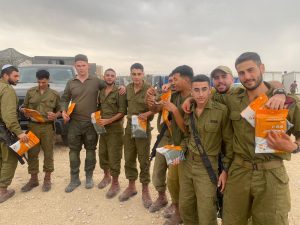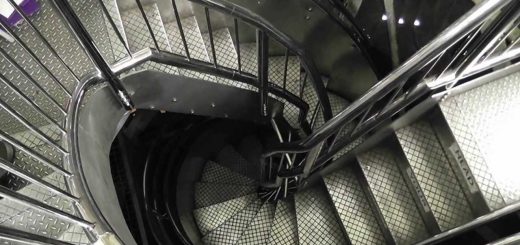Messages From the War – Monday

Monday.
Haazinu ha-shomayim/Heavens, give ear! (Devarim 32:1) The heavens over Yerushalayim complied, with a pall that hung over the city, reflecting back the mood of shock, disbelief, and foreboding of the people.
Roads were empty. There was little activity, other than some grocery shopping. There was an eerie, pervasive quiet that was constantly punctuated by the sounds of jets on their way to bomb Gaza.
There was no real reason for this. Jerusalem had an easy day dealing with incoming rockets. We only had to scramble for the shelters a small number of times. (Driving to a yeshiva – more on that later – the siren went off as I approached a busy intersection. I found a friendly patch of elevated concrete, pulled my car up on to it, and ran for the parking lot of the Ramot Mall.) Israelis have always picked themselves up after terror attacks, dusted themselves off, and proceeded with their lives. Not this time. People simply were not in the mood to do anything, other than join in innumerable efforts to aid soldiers and families of victims. The only traffic jam you could find on Waze was approaching Har Herzl, where hundreds converged for the burial of a lone soldier from the UK, who was a stranger to all.
Schools were closed, and will be on Tuesday as well. That posed a problem for doctors at Shaarei Zedek hospital, who had kids at home. They sent out a request for babysitters via social media. It did not take long before they were turning down volunteers, because the need had been filled.
There are collection places all over, where people bring supplies for soldiers who joined their units without an opportunity to first go home and pack.
The mood was uniformly somber and morose. If you would have tried to tell a joke, the glares you would have received would have killed. Yet, the mood was certainly not one of despair. To the contrary. The harsh divisions, the angry vituperation of the last months disappeared. We mourned – and worried – as one.
Also: the incomprehensible failure of army intelligence reduced regard for army leadership to rubble. But it was replaced by something far more important. We all watched (and to some extent, participated) in the mobilization of 300,000 reservists, complete in less than 48 hours. We shared messages that they sent from the front – all full of incredible spirit and astronomical morale. We realized that the IDF is not its leadership – inept or qualified. It is the incredible soldiers, their families, and the nation that stands and prays behind them.
Charedi yeshivos began the winter zman a week early. Two of my grandsons learn in Yeshiva Nesiv HaDaas, colloquially called “Kaplan.” I have a seder there a few times a week, and decided to be on hand for the opening of the zman, which was followed a few hours later by an opening shmuess by its eponymous founder, R Naftoli Kaplan. Typically, the opening shmuess would be an inspirational paean to the glories of learning Torah. That didn’t happen. Rav Kaplan is both a master educator (American by birth) and a devotee of mussar – of developing the character and internal environment of students.
Instead, he announced that he would be addressing the current tragedy. To do this, he said, he would first have to take them on a tour of some essentials about G-d’s providence, all taken from the Ramchal. Synopsizing it would dilute it beyond recognition. Let’s just say that he dealt with issues of divine justice, its cleansing power, and especially the topic of Tikun Kelali, and the role every individual has in bringing about the Perfected Community. He stressed repeatedly that no one can account for the way that midas hadin, Hashem’s attribute of justice, works. There is a place for midas hadin; we will never understand in this world why it strikes this person or group rather than another. Nor does it matter whether the people were young or old, secular or religious. Clearly, midas hadin was operating on Shemini Atzeres.
The crowd waited expectantly for him to put it all together, and make his recommendations. They had to do with feeling the intensity of pain of others, and assuming some of that pain personally. Mostly, it was about understanding the Torah responsibility to be part of the greater klal of the Jewish people.
The message may have been the most important insight that the young students take away from this war.
It would be expected that R Asher Weiss would provide words of chizuk to the entire community, and he did not disappoint. The thrust of his words was emunah: not to let the images and cries we heard shake our bedrock belief and faith in Hashem. He mentioned that the Kloizenberger Rebbe had told him about his own travails in private conversation. The Rebbe saw a wife and eleven children murdered in the Holocaust, survived a long stay in Auschwitz, and went on to become a powerhouse builder of institutions in Israel. He told Rav Weiss that never once during those years of darkness did he question G-d’s ways.
The Rebbe also provided a powerful vort that marks out for us the path we must take going forward, said Rav Weiss. We all cover our eyes when reciting the first line of the Shema. Why? Shulchan Aruch says so that we won’t be distracted while proclaiming our belief in and allegiance to Hashem. If so, asked the Rebbe, closing our eyes would be sufficient. Why cover them?
The Rebbe offered this explanation. Coverning our eyes is a demonstrative statement. In the Shema, we would refer at the begin to both Hashem and Elokeinu, i.e. to the attributes of both compassion and justice. Sometimes in life, we would find plenty of that compassion. At other times, however, we would encounter the pain and suffering that come with His justice. We cover our eyes to tell ourselves not to look at whether we can see chesed around us, or only the harshness of din. That is irrelevant to us. We declare our belief in Him, and our conviction that Hashem echad – that both chesed and din are ultimately parts of His Ultimate Reality of chesed.



https://minchasasher.com/he/shiur/uncategorized-he/%d7%93%d7%91%d7%a8%d7%99-%d7%97%d7%99%d7%96%d7%95%d7%a7-%d7%95%d7%94%d7%aa%d7%a2%d7%95%d7%a8%d7%a8%d7%95%d7%aa-%d7%91%d7%a2%d7%a7%d7%91%d7%95%d7%aa-%d7%94%d7%a4%d7%99%d7%92%d7%95%d7%a2-%d7%91%d7%a9/
Rav Asher Weiss- דברי חיזוק והתעוררות בעקבות הפיגוע בשמחת תורה
https://m.youtube.com/live/3kOBG5W-dBM?si=nGbF8mIfPMUoKYvF
דברי חיזוק לרגל המצב | הרה”ג זלמן ברוך מלמד שליט”א
R’ Weiss’s chizuk and R’ Mlamed’s. Interesting in the similarities and differences (especially in the call to action)
Hashem Oz Lamo Yiten, Hashem Yivarech et amo bashalom
Thk u Rabbi Adlerstein
See here as wellhttps://www.yutorah.org/